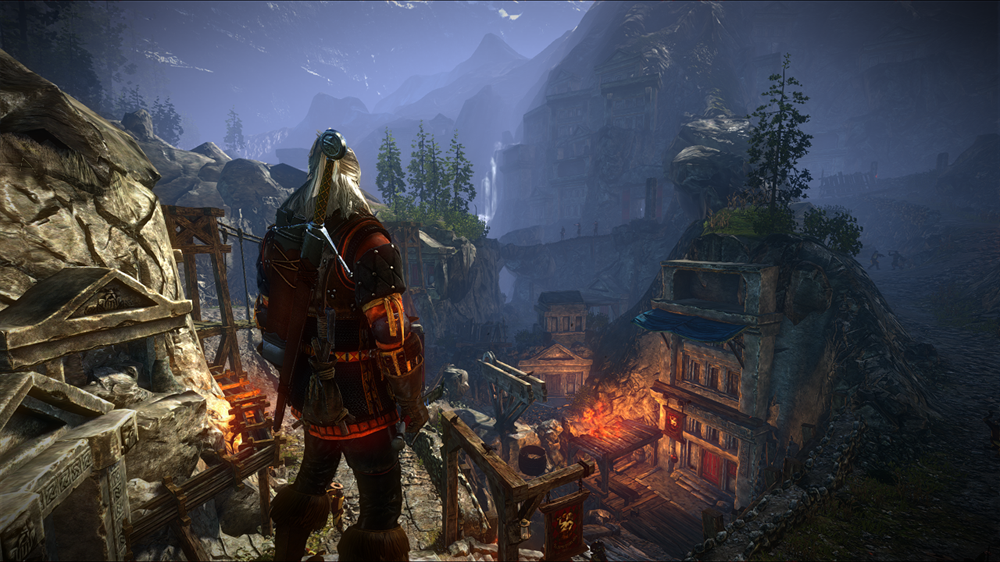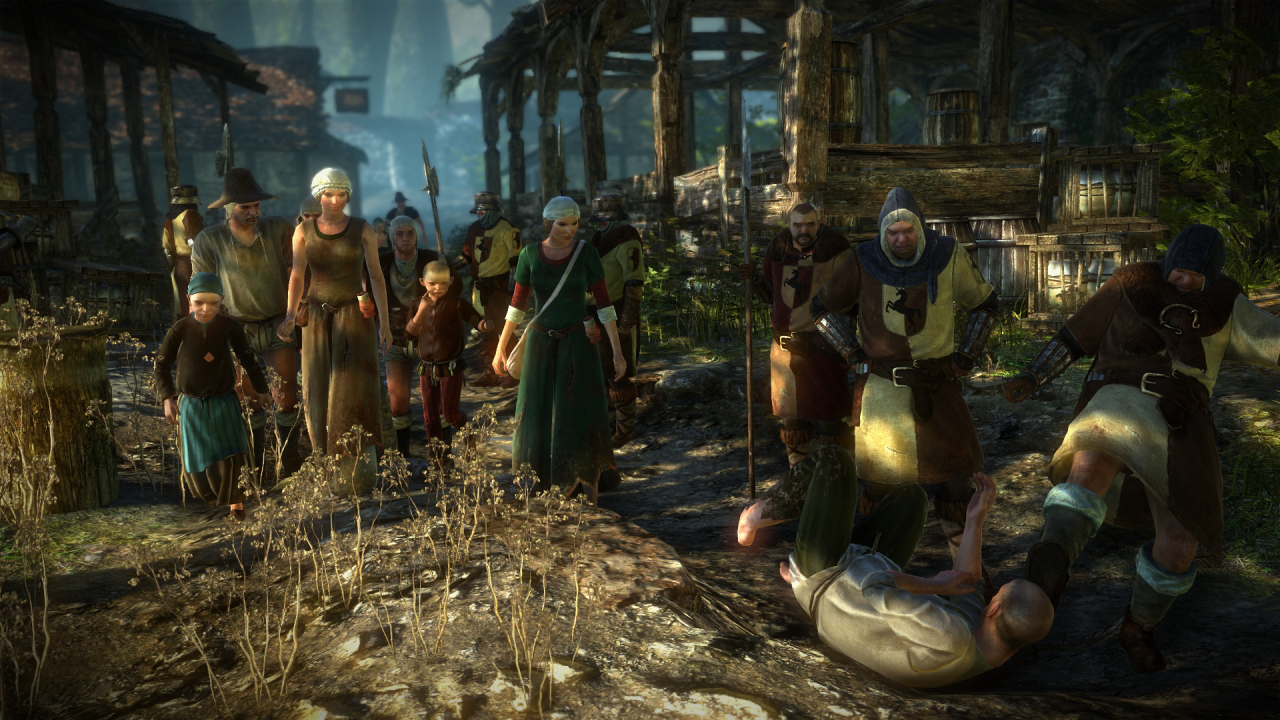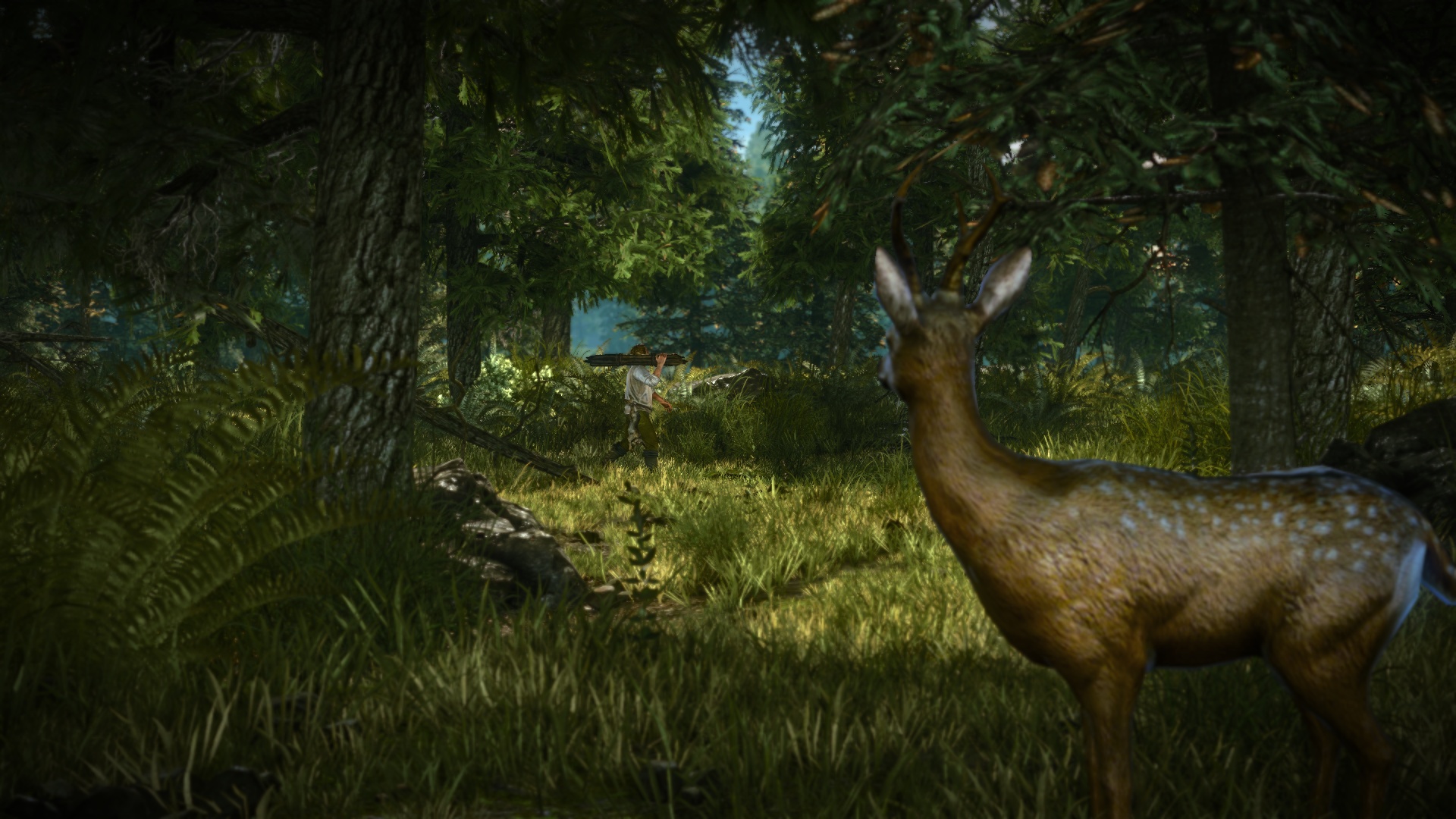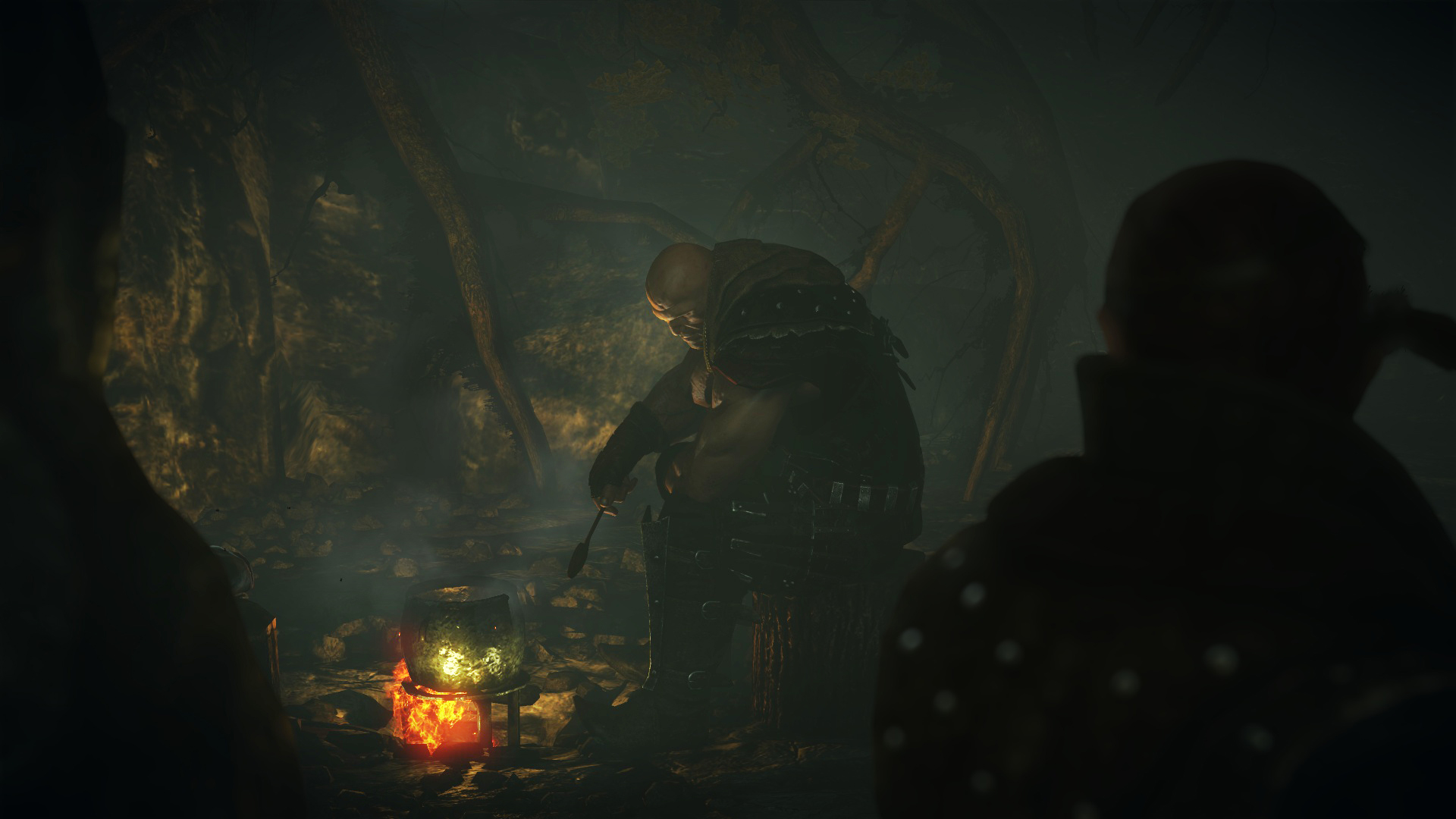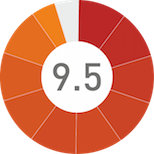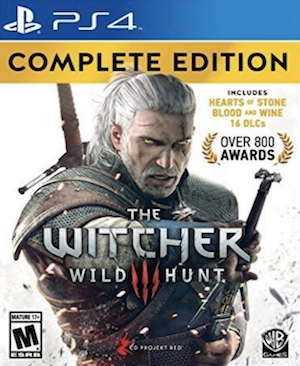The best comparison I’ve ever heard regarding The Witcher went like this: if you consider The Elder Scrolls games to be analogous to The Lord of the Rings, then The Witcher games are gaming’s very own Game of Thrones. And just as The Elder Scrolls games are the embodiment of the spirit of high fantasy that epitomizes Tolkien’s masterpieces, CD Projekt Red’s The Witcher 2 is the video games equivalent of George RR Martin’s visceral fantasy series, complete with political intrigue, morally dubious decisions, and self motivated characters, all willing to further their own interests at the expense of others.
The first Witcher game was somewhat of a breath of fresh air when it hit the PC a few years ago- all RPGs offer fantasy settings, and promise choices with impact and consequence, and quite a few modern ones promise to deliver ‘mature’ experiences. But where other RPGs falter, offering only simple, dichotomous black and white choices, with little to no visible impact on how you play the game, and with their maturity restricted to copious amounts of blood and gore, swearing and lewd jokes, all of which more often than not betrays the game’s immaturity by catering to the idea of what an adult storyline should be rather than what it is, The Witcher delivered. Its choices fundamentally changed the story you got to experience. Its setting was dark, gritty, and mature in a very understated manner, with disturbing machinations and undertones, and no attempt made to hide the ugly interior hiding beneath the game’s well realized world. Its protagonist was a man who fell right in the grey zone of the moral spectrum, and who was forced to make similarly morally disturbing choices with distressing implications. In other words, The Witcher was a game that delivered on all the promises that every RPG makes, but few ever fail to make good on.
Coming from a small Polish developer, it was a revelation, and when the sequel was announced, everybody awaited with bated breath. Its release brought to the masses what is possibly the truest RPG we’d seen in years, and one that upped the ante on every single one of its predecessor’s considerable accomplishments. So far, this wonderful experience had been restricted to PC gamers. Now, however, less than a year after the game first released, the developers have taken it upon themselves to release an enhanced edition of the game on the Xbox 360. Along with the free update that all PC owners of this game will be getting, this new edition represents the most complete and thoroughly realized edition of the game yet.
This review of The Witcher 2 will be coming from someone who has no past experience with the games or series. I have not played the PC games, and the Xbox 360 port of the game was the first chance I had to go on hands with the game. With that out of the way, let’s delve right in.
The Witcher 2 follows the story of Geralt of Rivia, the titular Witcher- think of Witchers as analogous to witches in medieval Europe, and you kind of get the idea. Suffering from amnesia, and branded a regicide, Geralt is on the run as he attempts to clear his name, and track down the true kingslayer. The story of The Witcher 2 is breathtaking and full of incredible locations, well developed, if not always likeable, characters, each with their own selfish motivations, and a flood of twists and turns that always keep you guessing as to what might happen next. To give any of it away would be to do the reader a disservice. The Witcher 2 is best experienced first hand, and its story is best when you go in blind.
What I can tell you about its story is how it differs from other games with fantasy settings. Yes, there are elves. No, they aren’t happy and mysterious supernatural folk who live in the woods, isolated from the world of humans. Rather, they are a suppressed group that has taken to insurgency to lash back at humans. Yes, there are dwarves, but again, they aren’t the busy smith and stoneworkers that we find in every other story. The dwarves in this game represent a nation in decay, a society rife with lethargy and corruption even as it rests on the laurels of its past accomplishments.
There are kingdoms, and they are all at war. Each kingdom led by a monarch who doesn’t care at all about diplomacy and statesmanship, and instead is more hell bent on carrying out his or her selfish motivations on the battlefields. Thousands may die because a king and his wife can’t agree on the succession to the throne, and have gone to war. Who cares? Not these two. They just see everything as a complex political game, and everybody under them, their civilians and their armies, are just pieces on the board for them.
There is magic, lots of magic, and yet those who use magic are are looked upon with suspicious eyes, and openly frowned down on behind their backs. There are various cities, and forests, and all the locales that you would expect in a fantasy tale- and yet in each city, corruption runs rampant, with prostitution, petty justice, roadside brawls, drunken gambling. And against the backdrop of this all, the citizens and people of this world toil away, continuing with their lives.
CD Projekt Red’s greatest accomplishment is in how well realized this world and this story is. The gritty, dirty cities of the game are presented as a real place, that would exist in spite of the player, and not just because of him. As you walk through the cobbling streets of Flotsam, you hear snippets of conversation among the people. And all of these are meaningful, all of these worth stopping and listening to, none of them just the disembodied and meaningless chatter that so often characterizes NPCs in other expansive games like Elder Scrolls and Grand Theft Auto. Stopping and responding to someone who hails you down is almost always worth it, and not just because of the traditional RPG convention of being offered a sidequest that might yield good rewards- the people will always have something worth listening to, and you will come away from each conversation more knowledgeable about this world you have been dropped in, and as a result, you will find yourself caring that much more about what happens to it, a hive of villainy though it may be.
Your personal connection and attachment to the story is further enhanced by the fact that you have an impact on how it all plays out. Every RPG promises choice, but what all of them end up offering is multiple dialog choices that might look different, but always end up offering a few variations of the same one, at most two, alternatives. Not so in The Witcher 2. The very first dialog choice you are presented with in the game has a major impact on your game experience- depending on how you answer it, in fact, you might end up locking yourself out of certain quests and portions of the game entirely. Everything you say and everything you do all adds up. A character you might have chosen to help at the beginning of the game will turn up later and help you escape. As he helps you escape, he makes it clear that if the other guards see you, he will be forced to fight you by their side- and if you end up killing him, then you alter the flow of the story again.
It’s the little things like these that make you realize how variable The Witcher 2 really is, and just how much control you have over the story, but the true realization will probably come after multiple playthrough. Innocuous choices that you make end up altering the game and the story entirely- the middle third of the game is completely different based on some choices you made over the course of the first third of the story.
The Witcher 2 therefore convinces us that our decisions and choices really matter, and from more than just a gameplay and story standpoint. Some of the choices in the game are morally disturbing, with no correct answer. Most of the times, the player will end up choosing based on the lesser of two evils, but he will always hate himself for it. The Witcher 2’s world is a grim one, and his actions are adding more distress to a world that hardly needs more of it.
And yet, you will continue. You will go on, even as you find yourself despairing at everything that is going wrong. The story is captivating, and you have your own personal attachment to the game world, yes, but from a mechanical standpoint too, The Witcher 2 is compelling, and urges you to play on. Whether it be the combat, which plays out much more differently than other RPGs- it is a lot more tactical, slow paced, strategic. Button mashing is frowned upon, and heavily punished, and more often than not, you’re forced to use every last ability at your disposal to emerge victorious- to the game’s fully realized weapons and abilities system, to its items and equipments, enhancements, augmentation, alchemy, meditation, The Witcher 2 is the truest RPG we have had in years, and unlike other recent RPGs, like Skyrim, which attempted to streamline the RPG elements to remain appealing to the mainstream market, The Witcher 2 makes no bones about the fact, and it makes no compromises.
The result is a game that, coupled with its high difficulty, and its slower and more deliberately paced (and placed) combat, is alienating to most. Make no mistakes, just because you liked Skyrim or Dragon Age or Mass Effect 3 is unlikely to mean you will like The Witcher 2. In fact, chances are you won’t. The game is made for an entirely different type of audience, one which appreciates the sheer flexibility and wealth of options that old school RPGs once provided.
The problem is somewhat further exacerbated when you consider that The Witcher 2 was never made for a console to begin with. The combat system and mechanics, the structure of the game, everything, was made with the keyboard and mouse control scheme in mind. And while CD Projekt Red have done a commendable job of adapting the game’s control scheme to the Xbox’s much more limited gamepad, it takes a while to get the hang of things. For the first hour or so, you will probably end up finding yourself in the wrong menu repeatedly, find that you unsheathed the wrong sword, find that you used magic when you wanted to lay down a trap, or threw a bomb when you wanted to use magic. You will struggle to find sense in the game’s combat move chaining system. It will take a while to get used to it, because even on the Xbox, The Witcher 2 remain an RPG designed for computers.Once you finally do get the hang of everything, however, you will be rewarded with the most mechanically satisfying experience possibly ever on a console. Recent RPGs like Dark Souls have been lauded for their difficulty, but those are games that are difficult on brute force, limiting what the protagonist can do, and throwing him up against overpowered enemies. In The Witcher 2, you will be fully equipped, a character who the story mandates is powerful, and yet find yourself overwhelmed. It’s a different kind of difficulty, one that will leave you frustrated, but that will never appear unfair, and no matter how many times you die, you will keep on trying, because you know there’s a way out, just that you can’t find it.
As well as the controls were handled in this port, the graphics were probably handled better. On the PC, The Witcher 2 is a looker. On the Xbox 360, this remains true. Whereas I have not played the PC version to compare the Xbox version against, I can tell you that on its own, the game is beautiful. People who have played more versions tell me that the game on consoles is equivalent to medium settings on the PC. Maybe so, but it still looks beautiful. And with no framerate drops, smooth animations, and textures that hold up remarkably well, The Witcher 2 qualifies as one hell of a looker on consoles, and as one of the better looking Xbox games.
There are instances- mostly during the cutscenes- where there is minor screen tearing. Often, you will notice pop ins. But these are all very minor, and only noticeable because they serve to remind you, however briefly, that this lush and rich world you are in right now is, after all, a game world, and not a real place. The fact that they bother the player at all is a testament to how well CDPR did their job everywhere else in the game. And remember, most of these issues can and will be avoided if you install the game to the hard drive. The performance of the game improved noticeably once it had been installed, and there really was no going back after that.
What else is there to talk about? The game’s soundtrack, which is incredible. Not like the wide, sweeping orchestral scores of Dragon Age, Zelda, or Skyrim, but rather a much more subdued and grim score that adds to and enhances the atmosphere of the game. The well done voice acting, which is without exception memorable. The dialog, which is sharp, crisp, and never redundant. The Witcher 2 is just a well made game all around, and it’s a game that makes no bones about what it is- a true, hardcore RPG, telling a grim, adult story about real people moved by real motivations, all inhabiting a very real world. The sex and gore is copious, and would, at first sight, attract the mainstream gamer, but a few minutes will almost certainly turn the mainstream gamer away as he returns to play Skyrim or Call of Duty. The Witcher 2 is a game that means business, and it brings its A game. It is unyielding, and makes no exceptions and compromises. If you are to play it, you better bring your A game along too. If you do, however, prepare to be rewarded with what is undoubtedly the best RPG to ever have appeared on a console.
This game was reviewed on the Xbox 360.
Second opinion by Jordan Garland:
The Witcher 2: Assassins of Kings was first released exclusively for PC, back in May 2011, amidst vast critical and commercial success, picking up over fifty awards along the way.It’s little surprise then that The Witcher’s Polish creators, CD Projekt RED, decided to update and upgrade the game for the console market, as well as addressing some of the more maligned aspects of the original. So here we have the Enhanced Edition, still sticking with the whoreson witcher, named Geralt of Rivia, it now also features a myriad of new features, some of which are to cater for the mushy-headed console gamer, as well as new locations, characters, cinematics and a gloriously stunning pre-rendered cinematic. Some purists see this move as devaluing PC development but in my opinion CD Projekt have done a staggeringly good job not merely porting a game, but a fully-fleshed adaptation.
I’ll try my utmost to avoid any obvious comparisons with Skyrim, largely because to lay them side by side is entirely unfair to both games, it’d be like comparing The Greatest Christmas Film of All Time, Die Hard, with something like Pulp Fiction. Both are excellent games in their own right and Tolkien-infused RPGs but aside from that, both games differ on almost every level.
In my preview, my only real criticism was the huge degree of texture pop-ins, in an otherwise brilliantly rendered game. Upon loading up the game for the first time, you’re actively instructed to install the game to your hard-drive, a practice I rarely dabble in due to its seemingly pointless nature but, in this instance, it makes a world of difference. Okay, the issue still persists but only when occasionally turning a corner too quickly, or kicking the shit of out of twenty bastard nekkers but there are moments which provide for some of the best graphics the 360 has ever showcased. Additionally, the game’s prologue didn’t really do itself any justice and whilst it looked all fine and dandy it pales in comparison to the gloriously realised and creatively titled Forest near Flotsam.
The story itself begins through recollection, Geralt is captured and has to recall the events leading up to a major plot point. Interestingly, CD Projekt took the decision to allow the player to retell the three ‘segments’ of recollection in any order they wise, an interesting touch but it fails to really add anything to the game and, if anything, serves to potentially bewilder the player. Aside from your stock ‘cinematic’ in-game cutscenes, there are also some rather astutely stylised cartoons depicting events Geralt is slowing remember. Oh yes, did I mention he has amnesia? Bizarrely, there’s also a fourth -I think- storytelling device, namely the stomach-kickingly irritating tones of Dandelion, a poet so middle-America it makes me want to spew mead everywhere. As well as being utterly abhorrent, shattering my immersion like Lee Cattermole does shin bones. It’s entirely unnecessary, delivering very little other than my unbridled hatred. This shotgun approach to storytelling is exactly that, hitting the mark in some areas but these interstitials seem to serve as padding, something which a 40+ hour game certainly doesn’t need more of.
One of the very best elements of The Witcher 2 is its use of lighting, it serves to set the tone for every time of day, at each location, the dawn sun awakening all and slowly filling the locations with life.
This forest almost feels like a character, the entire place brimming with a burgeoning sense of life, life which incidentally wants to tear you into pieces and save some for later. Every segment feels crafted, a careful construction which seems to envelop all within it. I frequently found myself lost not down to poor level design but intentionally so, even The Witcher himself feels virtually powerless compared to this mass of nature.
Upon beginning the first act, the ploughing Witcher finds himself in Flotsam, a merchantile settlement currently between a rock and a hard place. Sea-side, an estuary-dwelling Kraken is tearing the port a new-one whilst the forests are dominated by many a creature and the Scoia’tael, enemies of Temeria and a continuation of the trend which looks upon elves rather unfavourably. It’s like the entire fantasy genre sat down, sick of the righteous chastity of Legolas and Agent Smith, instead portraying them as self-serving, insular arseholes.
I think one of my favourite moments of the game is but an optional side-quest and whilst the bulk of the plot is excellently written and well delivered, even when miscellaneous NPCs are involved, none quite were as tragic as this one troll. Sitting beneath a bridge, as they are eternally fated to do so, you’re tasked with ‘dealing with’ him, as he’d stopped taking tolls for the bridge and thus cutting off Flotsam from the inland. In Skyrim -sorry-, you’d would be tasked with killing the troll and that would be that whereas here, yes it’s an option but after initially being confronted and drawn into battle with him, it turned out he’d started to hit the bottle because some heartless bastard had gone and killed his wife, for no apparent reason. Okay, not every NPC is this fleshed out and equally not every creature has a tear-jerking backstory to rival the winner of Britain’s Got Talent every bloody year, but this twist on the expected norm is precisely what makes The Witcher 2 so rich, vibrant and, most importantly, mature. This maturity is also reflected in not only the language and themes which the game explored, but also the nature of the moral/split second decisions Geralt has to make, decisions which shape the game in ways not initially apparent but, in time, are inextricably linked to the world and all who inhabit it.
Even the more superfluous, town-dwelling NPCs are well-realised, hailing from parts of the British Isles that extent beyond cockney, a very welcome addition into videogames; being a West Brom fan it’s quite nice that half the characters are from Smethwick. That said, there’s the occasionally jarring use of Americanism -see: boned, cocksucker- which sticks out like Skyler White at the International Not Being a Complete and Utter Bitch convention.
Combat is effective and somewhat less -again, sorry- hacky/slashy than Skyrim, a system in which I regularly found myself brandishing my weapons like deadly, dragon-busting maracas. That’s the very reason most RPGs are third person, it allows for a targeting system and thus more free-flowing combat, and that’s exactly what The Witcher 2 provides. Combined with the slow-motion magic-selection tool, it provides a more robust feeling system, if occasionally a little repetitive.
The Witcher 2: Assassins Kings will take you on an excellent adventure into the more mature side of the fantasy genre, adopting a more Game of Thrones approach which, whilst occasionally gratuitous, is well-measured and ultimately thrilling in its execution.
Great graphics, excellent soundtrack, voice acting and dialog is surprisingly well done, a fully realized game world with real characters with real motives, all of whom you care about; deep and expansive gameplay mechanics that represent the truest RPG we have had in years; true player choice that always matters and significantly alters the flow of your game
Minor screen tearing and pop ins, unless you install the game; the game's controls can take getting used to; inaccessible, and not for everyone









